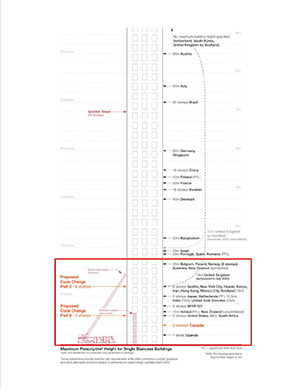“Will that be one staircase or two?”
As taller multi-level residential developments become seen as one of the answers to a global housing shortage, the question arises regarding whether buildings over a certain height should have two separate staircases.
Single Egress Staircase (SES) restrictions have been rooted in concerns over emergency egress for occupants, particularly in the United Kingdom, a country still haunted by the 2017 Grenfell Tower fire.
Russ Timpson, a former British firefighter and organizer of the U.K.’s Tall Building Fire Safety Network, writes that largely as a result of the Grenfell fire, the U.K. government recently mandated all new residential buildings over 18 metres in height have a second staircase.

In New York, the city’s two-staircase fire safety position has been entrenched for more than 100 years.
“To a New Yorker, the idea that the U.K. would even need to discuss the merits of a highrise having two exit stairs would be ludicrous. It’s just so ingrained in the building codes,” writes Chris Fogarty, principal of New York architecture firm Fogarty Finger.
“In the event of a fire, tenants can either use the rated internal stairway or exit through their windows and descend the metal fire escapes. These fire escapes define the character of many of NYC’s older neighbourhoods like Soho and Tribeca.”
In Canada, changes to SES restrictions are under discussion.
Under the current National Building Code (NBC), new apartment buildings over two storeys must have two staircases. However, the element of safety is not clearly laid out beyond that, writes Toon Dreessen, president of Architects DCA.
“When it comes to occupant health and safety, Canada’s building codes see little or no difference between seven-storey and 70-storey buildings. The code categorizes both as highrises and makes them subject to the same requirements. The problem, of course, is that there is a world of difference between trying to fight a fire or safely exit from a seven-storey building versus one that is 10 times higher.”
In fact, single staircase maximums vary greatly by building height and storeys around the world. Canada’s two-storey restriction ranks at the bottom, with only Uganda lower at one storey. The SES restriction is six in New York City, 16 in Sweden, 50 metres in France and 60 metres in Germany.
Experts say Canada’s decades-old restrictions on single staircase residences conflicts with the need to increase urban housing density and improve interior layouts and cross ventilation of apartment units. They say these interior comfort issues need to be re-examined in the context of what constitutes a safe building today.
In his 2022 analysis of Canada’s staircase rules relative to other countries, Conrad Speckert, intern architect at LGA Architectural Partners, wrote, “Canada is one of the most restrictive jurisdictions regarding the maximum height for single stair buildings, and this presents a significant obstacle to building the much-needed ‘missing middle’ of housing.”
This is particularly true for smaller lots, he says.
“While 85 per cent efficiency is usually achievable with two exits on larger properties, small infill sites cannot accommodate the depth of a double-loaded corridor floor plan and achieve this target.”
Speckert also points to advances in building performance and fire mitigation measures that provide effective tools for fire safety, like sprinklers, stringent fire separations and positive pressurization of exit stairwells.
British Columbia will introduce code changes this fall to loosen SES restrictions, as per a provincial report released late June, Minster of Housing Ravi Kahlon wrote on LinkedIn. The ministry cites the potential to “deliver more homes faster for people” and “allowing for better use of space for building occupants.”
In Ontario, requests for SES changes in both the NBC and Ontario’s Building Code have come from several housing affordability groups.
The potential for more creativity and interior comfort enhancements with single central staircases is compelling, PUBLIC Architect senior associate Jamie Harte told Canadian Architect.
“It makes all kinds of small apartment buildings more high quality,” said Harte. “Everything gets a little bit more flexible and more creative when you don’t have to drive a corridor through the middle of your plan.”
John Bleasby is a Coldwater, Ont.-based freelance writer. Send comments and Climate and Construction column ideas to editor@dailycommercialnews.com.










Recent Comments